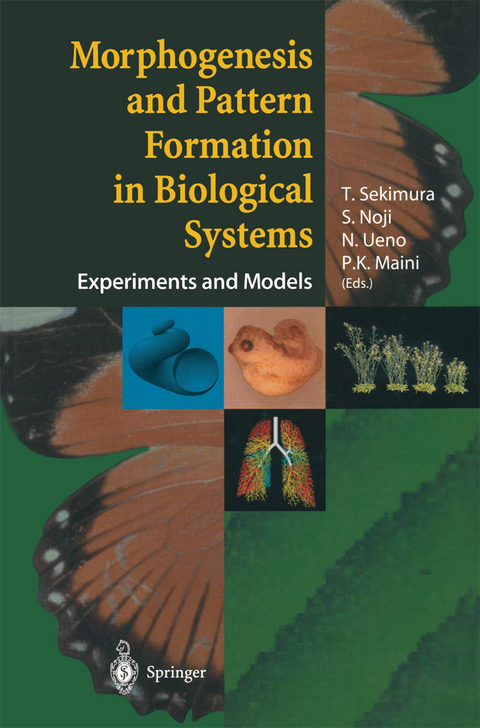
Morphogenesis and Pattern Formation in Biological Systems
Springer Verlag, Japan
978-4-431-65960-0 (ISBN)
Models for Morphogenesis and Pattern Formation.- Pattern Forming Reactions and the Generation of Primary Embryonic Axes.- Spatial Pattern Formation and Morphogenesis in Development: Recent Progress for Two Model Systems.- Alan Turing and “The Chemical Basis of Morphogenesis”.- On the Stochastic Geometry of Growth.- The Moving Grid Finite Element Method Applied to Biological Problems.- Morphogenesis and Pattern Formation in Animals.- Regulation of Pattern Formation by the Interaction between Growth Factors and Proteoglycans.- Changing Roles of Homeotic Gene Functions in Arthropod Limb Development.- Variation, Adaptation and Developmental Constraints in the Mimetic Butterfly Papilio dardanus.- Formation of New Organizing Regions by Cooperation of hedgehog, wingless, and dpp in Regeneration of the Insect Leg; a Verification of the Boundary Model.- The Heterotopic Shift in Developmental Patterns and Evolution of the Jaw in Vertebrates.- Morphogenesis and Pattern Formation in Plants.- The Development of Cell Pattern in the Arabidopsis Root Epidermis.- Pattern Formation during Dicotyledonous Plant Embryogenesis.- Regulation of Inflorescence Architecture and Organ Shape by the ERECTA Gene in Arabidopsis.- Axis-dependent Regulation of Lateral Organ Development in Plants.- Formation of a Symmetric Flat Leaf Lamina in Arabidopsis.- Morphogenesis and Pattern Formation Viewed from the Behaviour of Individual Cells.- Pattern Formation by Cell Movement in Closely-Packed Tissues.- Positioning of Cells at their Intrinsic Sites in Multicellular Organisms.- Spatial Pattern and Structure Formation in Ecological Systems.- Biological Invasion into Periodically Fragmented Environments: A Diffusion-Reaction Model.- Spatial Pattern Formation in Plant Communities.- The Mode of Competitionand Spatial Pattern Formation in Plant Communities.- Formation of a Structure of Exponentially Forking Branches with a Steady-state Amount of Current-year Shoots in a Hardwood Tree Crown.- Spatio-Temporal Pattern Formation in Epidemiology.- Patterns in Epidemiology of Sexually Transmitted Diseases in Human Populations.- Backward Bifurcation in a Model for Vector Transmitted Disease.- Morphogenesis and Pattern Formation in Medicine.- Mathematical Modelling of Solid Tumour Growth: Applications of Pre-pattern Formation.- The Formation of Branching Systems in Human Organs.- Computer Simulation on Morphogenesis of Colonic Neoplasia.- The Effects of Cell Adhesion on Solid Tumour Geometry.- Diversity of Biological Patterns in the Fossil Record and Their Meaning in Morphological Evolution.- Pattern Formation and Function in Palaeobiology.- Why do Univalve Shells of Gastropods Coil so Tightly? A Head-Foot Guidance Model of Shell Growth and its Implication on Developmental Constraints.- Computer Modeling of Microscopic Features of Molluscan Shells.- How Anomalocaris Swam in the Cambrian Sea; A Theoretical Study Based on Hydrodynamics.- Morphology and Function of Cuticular Terraces in Stomatopoda (Crustacea) and Mantodea (Insecta).
| Zusatzinfo | 32 Illustrations, color; 312 Illustrations, black and white; XX, 398 p. 344 illus., 32 illus. in color. |
|---|---|
| Verlagsort | Tokyo |
| Sprache | englisch |
| Maße | 155 x 235 mm |
| Themenwelt | Informatik ► Weitere Themen ► Bioinformatik |
| Mathematik / Informatik ► Mathematik ► Angewandte Mathematik | |
| Medizin / Pharmazie ► Medizinische Fachgebiete ► Onkologie | |
| Studium ► Querschnittsbereiche ► Infektiologie / Immunologie | |
| Naturwissenschaften ► Biologie ► Evolution | |
| Naturwissenschaften ► Biologie ► Ökologie / Naturschutz | |
| ISBN-10 | 4-431-65960-9 / 4431659609 |
| ISBN-13 | 978-4-431-65960-0 / 9784431659600 |
| Zustand | Neuware |
| Informationen gemäß Produktsicherheitsverordnung (GPSR) | |
| Haben Sie eine Frage zum Produkt? |
aus dem Bereich


